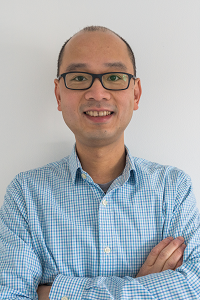LISB Special Volunteer
John Tsang, Ph.D.
Special Volunteer
Former Chief, Multiscale Systems Biology Section
Former Co-Director, NIH Center for Human Immunology (CHI)

Major Areas of Research
- Systems and quantitative immunology
- Single-cell modeling and analysis; the function and consequence of phenotypic heterogeneity and stochastic gene expression in immune cells
- Human immunology
- Systems immunology of COVID-19
Program Description
The Multiscale Systems Biology Section developed and applied systems biology approaches—combining computation, modeling, and experiments—to study the immune system at the organismal, cellular, and molecular levels.
Systems immunology
At the organismal level (particularly in humans), we have been utilizing natural variations (disease and genetic variation) and interventions (particularly vaccination) to systemically perturb the immune system and comprehensively assess its statuses pre- and post-intervention using multiplexed technologies in human cohorts. The resulting multi-modal data sets are analyzed and modeled in an integrative manner to 1) uncover biomarkers of immune responsiveness and health, 2) infer interactions among components of the immune system, and ultimately, 3) understand how immune responses are orchestrated quantitatively across scales—from molecules to cells to cell-to-cell interactions in space and time. We have also begun to generate and incorporate similar large-scale data from mouse models to develop a more complete (e.g., including dynamics and statuses of tissues) understanding. For an overview of our concepts and approaches, see Tsang JS. Utilizing population variation, vaccination, and systems biology to study human immunology. Trends Immunol. 2015 Aug; 36 (8): 479-93.
Immune cells and their adaptations to the environment: from cell populations to single cells
An immune response is a collective outcome of the coordination among a large number of cells operating over space and time. Throughout this process, individual cells (and cell populations) monitor and adapt to environmental signals. We are broadly interested in understanding how immune cells adapt to their environment and make decisions. Macrophages are particularly good models in this context. They are plastic and respond with diverse functional phenotypes to environmental challenges. In addition to host defense, macrophages play important roles in tissue homeostasis and have been implicated in a number of diseases. We are studying macrophage adaptation at both the cell-population and single-cell levels. We are utilizing dense measurements from flow cytometry, microfluidic qPCR (Fluidigm), RNAseq, ChIP-Seq, and CAGE-Seq to comprehensively characterize cellular states pre- and post-environmental stimulation, followed by integrative modeling and analysis. We are particularly interested in assessing cell-to-cell heterogeneity in transcriptional responses and understanding its functional consequences at both the network and cellular levels.
Inference and quantitative modeling of cellular and molecular circuits
We are interested in the general problem of inferring circuits at several levels, including interactions among cells and among molecules within cells. In addition to circuit topology, we are interested in understanding the mapping between topology and dynamics (and function), as well as the associated operational and design principles. Our general approach to tackle this problem has been to utilize arrays of experimental perturbations or natural variations in cells and organisms to “generate” diverse cellular and/or organismal phenotypes followed by comprehensive, multi-modal characterization of the resulting states. We utilize this dense sampling and measurement of the state-space to computational model and infer functional relationships among systems components. To close the loop, both experimental and computational follow-ups are used to further test and validate the resulting models and hypotheses.
Method development
Our main experimental tools include next-generation sequencing, flow/mass cytometry, single-cell transcriptomics and quantitative PCR. We are also developing and adopting approaches for highly multiplexed single-cell profiling. On the computational and quantitative modeling end, we employ or develop methods employing multivariate statistics, Bayesian network inference, linear models, and algorithms, and dynamical and stochastic modeling. We also aim to develop or turn internal toolkits into broadly distributed tools when it is apparent that they are useful in more general settings, particularly in settings where experimental biologists with little or no computational training can be empowered to generate and test hypotheses using large, complex data sets.
Biography
Education
Ph.D., Harvard University
Dr. Tsang is a senior investigator in the NIH Intramural Research Program and leads a laboratory focusing on systems and quantitative immunology at the National Institute of Allergy and Infectious Diseases (NIAID). He also co-directs the Trans-NIH Center for Human Immunology (CHI) and leads its research program in systems human immunology. Dr. Tsang trained in computer engineering and computer science at the University of Waterloo and received his Ph.D. in biophysics from Harvard University.
Before joining NIH, he worked as a software engineer in Silicon Valley, pursued genomics and proteomics in Rosetta Inpharmatics and Caprion Proteomics, and conducted systems biology and bioinformatics research on microRNAs and integrative genomics at the Massachusetts Institute of Technology (MIT) and Merck Research Laboratories.
Dr. Tsang has won several awards for his research, including NIAID Merit Awards for the development of a data reuse and crowdsourcing platform OMiCC and for leading a system biology study of human immune variability and influenza vaccination, which was selected as one of the top 20 NIAID Research Advances of 2014. He has served as a scientific advisor on systems immunology and bioinformatics for a number of programs and organizations including ImmPort (the clinical and molecular data repository for NIAID), the Committee on Precision Medicine for the World Allergy Organization, the NIAID Modeling Immunity for Biodefense Program, the Allen Institute, the Immuno-Epidemiology Program at the National Cancer Institute, and the Human Vaccines Project.
Selected Publications
Liu C*, Martins AJ*, Lau WW*, Rachmaninoff N*, Chen J, Imberti L, Mostaghimi D, Fink DL, Burbelo PD, Dobbs K, Delmonte OM, Bansal N, Failla L, Sottini A, Quiros-Roldan E, Han KL, Sellers BA, Cheung F, Sparks R, Chun TW, Moir S, Lionakis MS; NIAID COVID Consortium; COVID Clinicians, Rossi C, Su HC, Kuhns DB, Cohen JI, Notarangelo LD, Tsang JS. Time-resolved systems immunology reveals a late juncture linked to fatal COVID-19. Cell. 2021 Feb:S0092-8674(21)00168-9. *co-first authors
Kotliarov Y*, Sparks R*, Martins AJ#, Mule M#, Lu Y#, Goswami M, Kardava L, Banchereau R, Pascual V, Biancotto A, Chen J, Schwartzberg PL, Bansal N, Liu CC, Cheung F, Moir S, Tsang JS. Broad immune activation underlies shared set point signatures for vaccine responsiveness and lupus disease activity in humans. (* equal contribution; # co-second authors) Nat Med. 2020 Feb. Commentary in F1000: https://f1000.com/prime/737422796; Commentary in Nature Immunology: https://www.nature.com/articles/s41590-020-0656-y; Commentary in Nature Reviews Rheumatology: https://www.nature.com/articles/s41584-020-0421-5
Milanez-Almeida P, Martins AJ, Germain RN, Tsang JS. Cancer prognosis with shallow tumor RNA sequencing. Nat Med. 2020 Feb;26(2):188-192.
Martins AJ, Narayanan M, Prüste T, Fixsen B, Park K, Gottschalk RA, Lu Y, Andrews-Pfannkoch C, Lau WW, Wendelsdorf KV, Tsang JS. Environment Tunes Propagation of Cell-to-Cell Variation in the Human Macrophage Gene Network. Cell Syst. 2017 Apr 26;4(4):379-392. Commentary from Trends in Immunology: http://www.sciencedirect.com/science/article/pii/S1471490617301448
Lu Y, Biancotto A, Cheung F, Remmers E, Shah N, McCoy JP, Tsang JS. Systematic analysis of cell-to-cell expression variation of T lymphocytes in a human cohort identifies aging and genetic associations. Immunity. 2016 Nov 15;45(5):1162-1175. Preview from Immunity: http://www.cell.com/immunity/fulltext/S1074-7613(16)30430-7.
Tsang JS*, Schwartzberg PL*, Kotliarov Y, Biancotto A, Xie Z, Germain RN, Wang E, Olnes MJ, Narayanan M, Golding H, Moir S, Dickler HB, Perl S, Cheung F; Baylor HIPC Center; CHI Consortium. Global analyses of human immune variation reveal baseline predictors of postvaccination responses. Cell. 2014 Apr 10;157(2):499-513. *senior and corresponding author. Preview from Cell: https://www.cell.com/cell/fulltext/S0092-8674(14)00357-2. Commentary from F1000: https://f1000.com/prime/718348288
Featured Research
Systems Human Immunology
Ready, Set, Go: Immune System Status Predicts Future Responses
Single-Cell Variations – Functions and Networks
Systems Biology Advance: Environment Tunes Cell-to-Cell Variation

Public Data Reuse and Crowdsourcing
Crowdsourcing for Data Analysis—Web Platform Makes Public Gene-Expression Data More Accessible
Immune Response to COVID-19
NIAID researchers spearheaded a large, international collaboration to investigate the innate and adaptive immune responses during acute COVID-19 infection and convalescence. Read about the Multiscale Systems Biology Section’s participation in Immune Response to COVID-19 research.

